I want to begin my remarks this morning by thanking Senator Lynette Holder, CEO of the Barbados Small Business Association for inviting me to deliver the keynote address at this year’s State of the Sector Conference.
I also want to congratulate the SBA for its continuing advocacy of micro, small and medium-sized businesses across Barbados, and for organising this important event.
I encourage you to remain steadfast in your mission“to provide effective representation and exemplary development services to and on behalf of micro, small and medium enterprises, nationally” and to continue to play a leadership role in elevating MSME issues on the local policy agenda.
This Conference is a perfect opportunity for all stakeholders here today to exchange ideas and widen their collective understanding of effective ways to catalyse MSME development in Barbados.
By providing a platform for dialogue and exchange of information, fora like this one can deepen the partnership between the Government, the Small Business Association and MSMEs.
I feel especially privileged to have been asked to address this Forum on the topic “State of the MSME Sector in CARICOM – Prospects for the Future.”
This discussion is timely. In 2015, all CARICOM countries became signatories to the United Nations 2030 Sustainable Development Agenda. MSMEs are regarded as an important vehicle for achieving the Sustainable Development Goals (SDGs). Through their significant job creation impact, MSMEs can play a pivotal role in reducing poverty and income inequality, especially amongst women and youth.
The Caribbean Development Bank shares the SBA’s ambition to nurture and unleash the transformation potential of MSMEs and to create a strong, enabling business ecosystem.
Importantly, we, at the CDB, are in the midst of preparing our strategic plan for the period 2020-2024; and the MSME sector is emerging as a critical area for strategic and focused attention in our Region’s ongoing efforts to achieve sustainable and inclusive economic growth, and eliminate abject poverty, and inequality. Based on our almost 50 years of experience working in 19 borrowing member countries, including Barbados, we have come to realise that MSMEs across this Region share similar history, experiences, challenges and prospects.
Our intention, therefore, is to continue to craft programmes of support that are available and accessible to all of these countries.
I must also admit to my own personal and longstanding interest in MSMEs’ potential for contributing to economic growth and development, having myself grown up in a family whose livelihood was sustained by small business.
My colleagues at CDB can confirm that I consistently pore through the clippings of local, regional and international newspapers, and other publications in search of new information on MSMEs. The main objective is to broaden my own understanding of what strategies can galvanise the growth of the MSME sector in our neck of the woods, so to speak!
Even as I thank you for offering me this platform, I also seek your forgiveness for taking the liberty of expanding the scope of my mandate to speak, this morning, on the state of MSMEs and their prospects, largely from a regional perspective.
Interestingly, as I prepared for this event, I was reminded of the relative paucity of in-depth studies of the MSME sector in our part of the world, and hence the need for CDB to commission the study entitled “Micro Small Medium Enterprise Development in the Caribbean: Towards a New Frontier.” That 2016 study examined MSMEs in 12 Caribbean countries.
I assure you, ladies and gentlemen, that there is considerable commonality in the structure, experience, and challenges facing MSMEs across our Region. So too are the lessons which inform the appropriate policy responses for this group.
This morning I propose to draw four general conclusions.
II. MSMEs ARE ESSENTIAL FOR CARIBBEAN LONG-TERM GROWTH AND DEVELOPMENT
First, let me underscore the importance of MSMEs.
They are the backbone of the private sector and are key drivers of economic growth, and social inclusion in Barbados. Their importance for this island’s long-term growth and development is undeniable.
According to a survey commissioned by the Small Business Association in 2016, MSMEs in Barbados accounted for approximately 92% of formal enterprises and over 60% of private sector employment. The bulk of these jobs was in small service companies, which were responsible for 34% of private sector employment. MSMEs also accounted for 39% of total exports. In addition, 34% of enterprises had women as the largest owner, while 6% had equal male and female ownership.
Based on findings published in CARICOM’s 2016 Regional MSME policy and reconfirmed in the CDB-financed study, the situation in Barbados is very typical of the rest of the Region. On average, MSMEs contribute 50% of GDP and create 45% of the jobs in our Region.
But their full potential remains unrealised. MSMEs can do so much better.
What is the basis for my conclusion?
If MSMEs account for such a significant proportion of enterprises, and provide the bulk of employment, should we not also expect them to make a bigger contribution to Barbados’ exports?
Certainly if our MSMEs are operating efficiently, then it would be reasonable to assume that they are competitive and have the potential to export.
Therefore, we have to figure out how to unravel those issues that are preventing them from operating more efficiently, more productively and more competitively. If we understand the constraints, we can design workable solutions to unleash this potential and create a business environment in which MSMEs can grow and flourish in a well-functioning market economy.
Because of the size of its contribution to GDP, the performance of the MSME sector is generally a good barometer of the state of the wider economy. Further, because these countries are small and open, there is a strong nexus between our ability to trade and economic growth performance. Therefore, we must first come to grips with the issues affecting MSMEs, before our Region can expect to overcome the challenges of low growth, weak trade and investment, and persistently high poverty and inequality.
The issues, which are constraining MSMEs from realising their full potential are generally well known. A weak enabling environment; high energy and other production costs; limited and poor product/service quality and standards; and limited access to both loan and equity finance are the principal limiting factors.
III. GETTING THE ENABLING ENVIRONMENT RIGHT
This brings me to my second general conclusion this morning. If we accept these limiting factors, then those of us charged with policy-making must be resolute in our advocacy for giving high priority to creating a business-friendly environment within which MSMEs can develop.
The World Bank’s Doing Business surveys benchmark all countries which participate in the yearly exercise against the regulations that affect business performance. In the most recent survey of 190 countries Barbados ranked 129 and the average for the Caribbean was 126, suggesting that, relative to other countries, much work remains to be done to create an environment which is “good for business.”
In many Caribbean countries, there is ample evidence of inadequate legislative and regulatory frameworks; weak public sector institutions for providing legal protection; and inefficient business support and training services. In some Caribbean countries, for example, property registration continues to be time consuming and expensive because property rights are not adequately defined or protected. Bankruptcy laws are often excessively punitive; and severe penalties can confound the willingness to invest in new business ventures. Also, better enforcement of copyright, patents and trademarks is required to provide appropriate protection for businesses and to avoid litigation and copyright infringement.
Then, our Region suffers from prolonged delays in implementing agreements reached under the Revised Treaty of Chaguaramas. Several issues require urgent attention. For example, market access has not improved despite the removal of over 450 legal and administrative barriers to the free movement of goods, services, capital and labour in most CARICOM countries. The establishment of a single jurisdiction to allow for the equal treatment of business entities across CARICOM is outstanding. And a CARICOM business must still register in every jurisdiction in which it wishes to operate! And alien landholding licensing requirements are still in place.
Then, most of the 12 participating CSME countries have failed to enact the requisite legislation that would allow the free movement, of even the ten categories of persons that now have the right to seek employment in other CARICOM member states without the need for a work permit.
These are restrictions which add to the cost and slow pace of doing business, and hamper the extent to which CARICOM businesses can penetrate regional markets.
In the past 15 months, there has been a renewed focus on the CSME. I remain optimistic that accelerated interest in honouring Treaty obligations will follow shortly.
Our Governments must remain committed to improving the business environment and scale up their efforts to create a policy and institutional framework that responds appropriately to the characteristics and special needs of MSMEs. Are the tax regimes and regulatory requirements making compliance costs too burdensome? Or are they incentivising SMEs to remain in the informal sector? Priority must be given to cutting red tape; increasing the transparency and the cost-efficiency of regulations; collecting data on a systematic basis; and adopting stronger evidence-based policies.
During the Budget presentation earlier this year, Prime Minister Mottley gave notice of her Government’s intention to utilise technology to enhance the quality and speed of delivering services via online platforms for clearing imports, submitting planning and development applications, renewing driver’s licenses; obtaining Police Certificates of Character; and paying of taxes. These measures are encouraging enhancements of the business eco-system.
IV. ACCESS TO FINANCE
My third comment this morning directs attention to the difficulty that MSMEs face in accessing appropriate financing.
Because they drive economic growth and job creation, MSMEs can be one of our most potent weapons in the fight against unemployment, poverty and social exclusion. But to play this role effectively, the conditions must be also be “ripe” for them to grow and flourish. We have to give highest priority to creating an eco-system in which MSMEs become more willing to embrace uncertainty and to take risks.
Key to creating this environment is access to finance and financial services. Limited access to credit; the paucity of venture capital; and the generally underdeveloped nature of our Region’s capital markets are troublesome constraints facing MSMEs in Barbados and the rest of the Caribbean. The issue is not simply that funds are unavailable. In fact, even in situations where the financial system is reporting high levels of liquidity, MSMEs struggle to access resources from the banking system at acceptable interest rates.
Diagnostic studies conducted by the Inter-American Development Bank reveal that only 3-5% of Caribbean micro-entrepreneurs have access to financing. Indeed, financial institutions are generally reluctant to lend to MSMEs, because they lack adequate collateral; they operate in unfavourable business environments; or they have limited access to affordable accounting, legal, auditing and other services. According to the study also, MSMEs prefer informal modes of credit, which are relatively easy and cheap to secure. As a result, the uptake of micro-credit has lagged behind expectations.
This suggests that the mainstream financial system, working collaboratively with Government and the business community, may need to consider redesigning their products and offering special mechanisms for enhanced MSME access. These mechanisms could include:
(a) credit bureaux to facilitate the lending institution’s assessment of credit worthiness;
(b) collateral registries to restrict the possibility of fraudulent re-use of collateral;
(c) guarantee schemes, to reduce the risk spread in the pricing of MSME loans by sharing the risk with retail lenders; and
(d) additional financing channels, such as equity funds, angel investor networks and junior stock exchanges.
Let me make special mention of junior stock exchanges as a financing modality to promote the use of equity financing by MSMEs. Junior markets can be found in Barbados, Jamaica and Trinidad and Tobago. Jamaica, with the incentive of a ten-year tax holiday for listing, has the most active exchange. Important lessons can be learned from the experiences of these three junior markets.
One lesson for those countries without junior exchanges is that the legal reforms which encourage MSMEs to raise equity financing by listing their companies on local junior markets must be implemented to facilitate growth and expansion of small businesses.
I strongly recommend that MSMEs formalise their businesses by keeping proper accounting records and adopting sound business practices. The greatest inhibitor to accessing finance, global competitiveness, or even growth is the failure to adopt good business practices.
MSMEs should also register to be members of business support organisations. Across Europe, this is mandatory when registering a business. These organisations, similar to the SBA, lobby on behalf of their members, bring sector issues to the table, and represent their interests in policy discussions. BSOs are also key in capacity building, PPP engagements and making links in new markets.
V. BUSINESS CULTURE/MINDSET
My fourth point is with respect to changing the business culture and mindset. “The Biggest mistake that a small business can make is to think like a small business.”
I am not sure to whom I should give credit for this quote, but it describes succinctly the mindset needed for successful MSMEs and should be included, alongside effective business planning, good financial management, continuous marketing, and excellent customer service.
MSMEs are simply the incubators for most large businesses. So you must be able to visualise the company having the DNA of an elephant, as the distinguished Barbadian management consultant and newspaper columnist, Dr. Basil Springer would characterise it. Such a company would be capable of operating outside the narrow geographical confines of Barbados. With increased trade we can expect more jobs, higher economic growth and increased prosperity.
“Thinking big” will open up new opportunities for MSMEs to compete on the international market by becoming part of a regional value chain. The theme for this Conference, “Small Size, Big Thinking – Changing the Mindset for Global Engagement” says it well!
The attractiveness of this strategy is substantiated by the achievements of several large, medium and small Caribbean enterprises, which have grown their businesses by moving cross-border to other regional and international markets.
Companies like these become large by embracing behaviours and practices that engender superior levels of production efficiency and cost effectiveness. The regional market alone gives MSMEs immediate access to just over 18 million consumers under the CSME arrangement. Firms which are incapable of competing in the local and/or regional markets and do not employ good international business practices will not graduate to the world stage.
With duty and quota free access for most of our goods and services under the CARIFORUM-EU Economic Partnership Agreement, the European Union still offers a relatively protected market for regional MSMEs to hone their competitiveness skills prior to venturing onto the wider unprotected world market.
VI. CARIBBEAN DEVELOPMENT BANK
I have said quite a bit, this morning, about what needs to be done in the eco-system to support MSMEs in our Region. It would be remiss of me to discuss the development role and impact of MSMEs without mentioning my own institution.
So before I close, let me quickly recap CDB’s own contribution to supporting MSME development.
Our strategic posture is informed by three general principles:
(a) CDB’s operations should increase the flow of capital into BMCs for the benefit of MSMEs;
(b) We should use our interventions to enhance financial intermediation and develop regional and sub-regional capital markets; and
(c) CDB should cooperate and build alliances with other financial institutions, including multilateral institutions, to increase the overall impact of assistance to MSMEs.
Within this operating framework, since 2015, we have committed US$30 million and disbursed US$20 million to over 900 firms for private sector development. Going forward, our focus is on ramping up our engagement with the Barbadian and Caribbean-wide private sector whilst maintaining the high credit quality of CDB’s banking function.
There is scope and need for CDB to continue to intermediate funding to MSMEs through public and privately-owned financial institutions. However, careful attention will have to be paid to the pricing of our funding through the privately-owned institutions, in particular, to ensure that their on-lending rates are competitive.
We are determined to increase our involvement with MSMEs and to play an even bigger role in unleashing their potential. In this regard, we have embarked on some innovative approaches to attract additional financial flows for our MSME programme. In 2018, for example, we launched the multi-donor Cultural and Creative Industries Innovation Fund (CIIF) with start-up capital of U$2.6 million. There is no shortage of demand for CIIF which provides grants and technical assistance to MSMEs in order to encourage innovation and job creation in the creative industries.
Our most recent proposal is to mobilise additional financing which can be used to derisk lending to MSMEs by providing partial credit guarantees to financial institutions. Additional technical assistance will be offered to assist MSMEs in bolstering their creditworthiness by developing suitable marketing and business plans and ensuring that proper accounting systems are in place. This initiative is to be executed through the Caribbean Consultancy Technological Services, our main mechanism for delivering professional services to MSMEs. It is a small programme of direct technical assistance, workshops, and training attachments; but it delivers big results with huge impact!
VII. CONCLUSION
In closing, I wish to point out that the current business environment, while still being difficult because of weak global growth, has presented us with a window of opportunity in the form of increased funding for MSMEs.
CDB remains committed to supporting the development of MSMEs in Barbados and the rest of our Region. We are giving high priority to financing and promoting initiatives that enhance their competitiveness. And we are relying on institutions like the Small Business Association to help us design programmes that are better targeted for MSMEs to drive economic growth and employment creation in Barbados and the wider Caribbean.
By
Dr. William Warren Smith, CD President Caribbean Development Bank


 Businessuite News24 International2 years ago
Businessuite News24 International2 years ago
 Feedback & What You Think2 years ago
Feedback & What You Think2 years ago
 Marketing & Advertising2 years ago
Marketing & Advertising2 years ago
 Businessuite Women1 year ago
Businessuite Women1 year ago
 Businessuite 50 Power and Influence1 year ago
Businessuite 50 Power and Influence1 year ago
 Leadership Conversations1 year ago
Leadership Conversations1 year ago
 Businessuite Markets2 years ago
Businessuite Markets2 years ago
 RANKING2 years ago
RANKING2 years ago













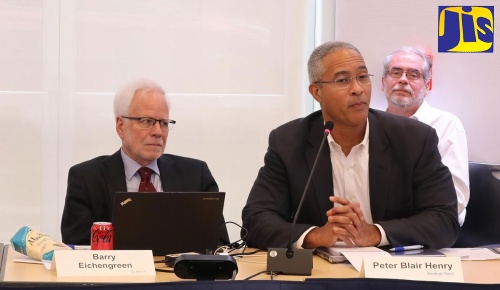
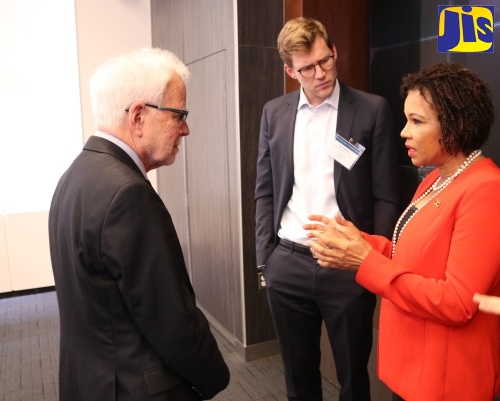

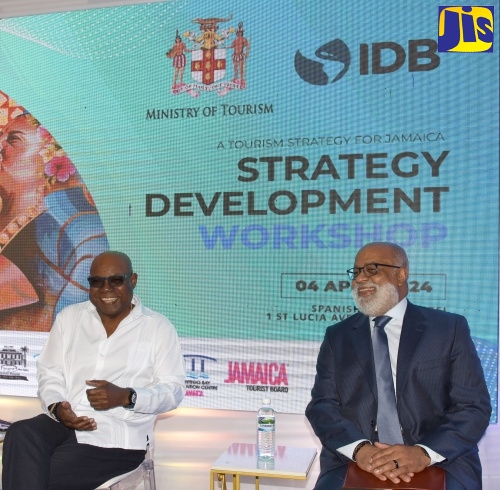
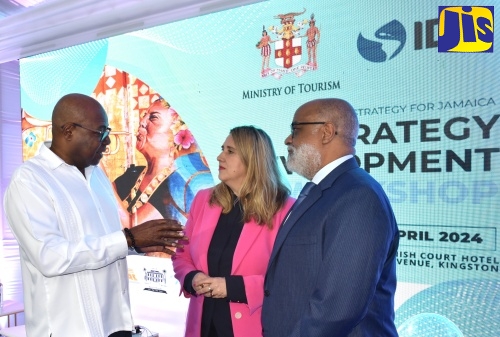
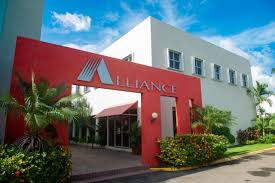
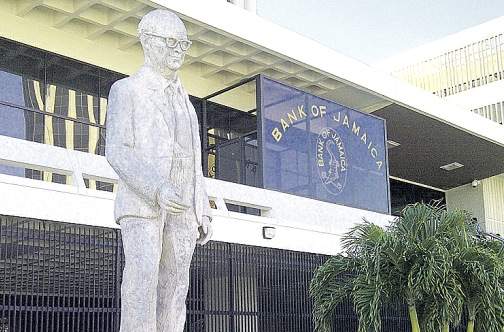 Bank of Jamaica (BOJ) takes note of the recent Court Decision in the matter involving Alliance Investment Management Limited (AIML), which is not a licensee of the Bank, and public commentary related to the actions taken by the Bank in December 2021 to suspend the cambio and remittance operating licences issued to then AIML-affiliated company Alliance Financial Services Limited (AFSL) effective 3 December 2021. The Bank’s actions also included the revocation of the authorisation granted to AFSL to operate in the Bank of Jamaica Fintech Regulatory Sandbox as a payment service provider effective 3 December 2021.
Bank of Jamaica (BOJ) takes note of the recent Court Decision in the matter involving Alliance Investment Management Limited (AIML), which is not a licensee of the Bank, and public commentary related to the actions taken by the Bank in December 2021 to suspend the cambio and remittance operating licences issued to then AIML-affiliated company Alliance Financial Services Limited (AFSL) effective 3 December 2021. The Bank’s actions also included the revocation of the authorisation granted to AFSL to operate in the Bank of Jamaica Fintech Regulatory Sandbox as a payment service provider effective 3 December 2021.



